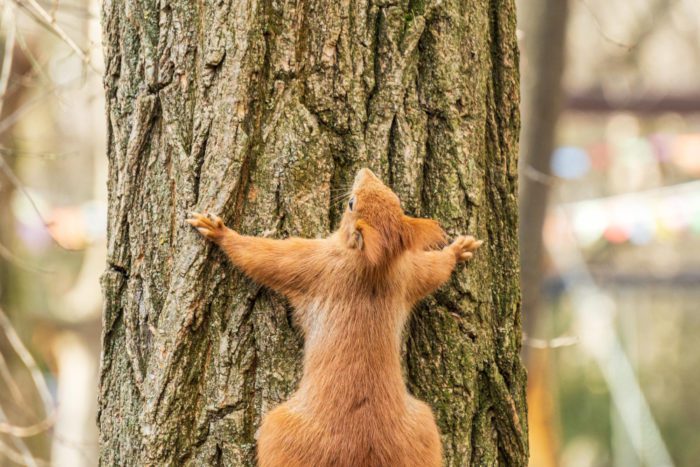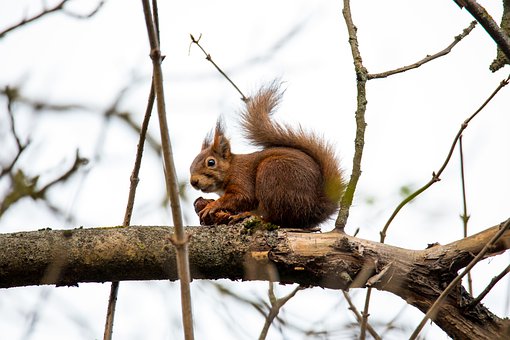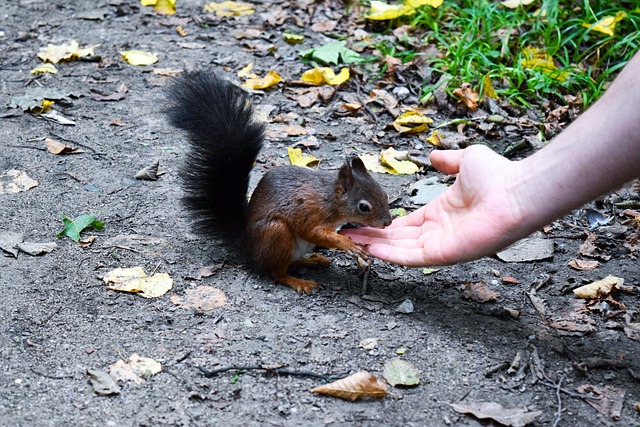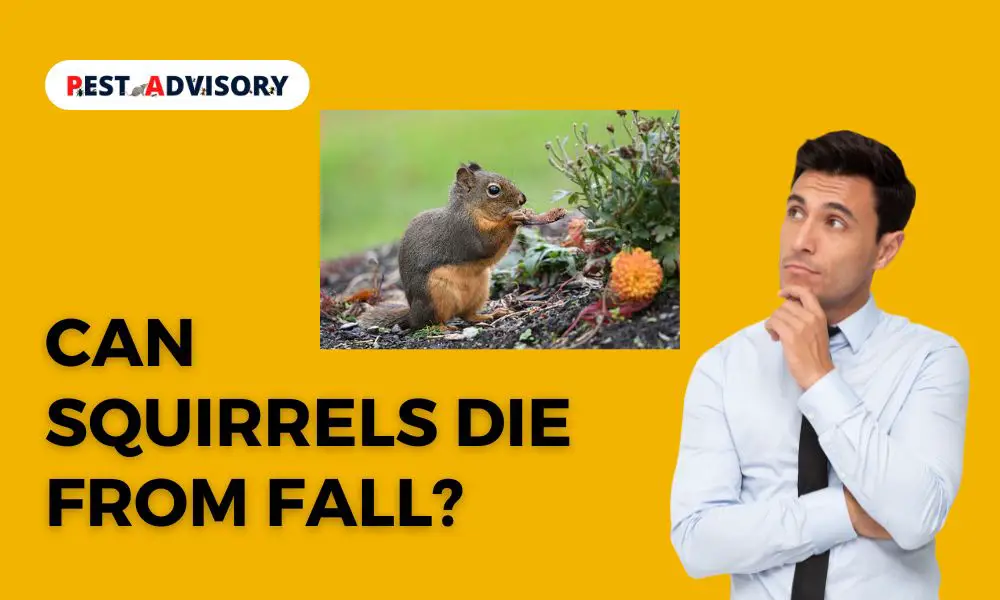Squirrels are known for their impressive climbing abilities and are often seen darting up and down trees with ease. However, have you ever wondered if squirrels can die from falling? Falls are a common occurrence in nature, and squirrels are no exception. Understanding the effects of falls on squirrels is crucial to understanding the survival and well-being of these fascinating creatures.
Do Falls Kill Squirrels?
No. Generally falling from an arbitrary height will not kill the squirrels. Be it on the asphalt or the hard frozen ground, the probability of the fall killing them from impact is next to nil.
There have been numerous eyewitness accounts who have seen squirrels falling out of trees and on the upper floors of multistorey buildings. They land. Get up. Shake themselves to probably get rid of the disorientation and then scamper off at full speed.
Important Note: If you're tired of pests and want a reliable solution, then you should definitely consider seeking help from a professional pest control company. DIY solutions can be effective, but if you're dealing with a significant pest infestation, you don't want to rely solely on DIY methods. Pest control companies typically don't charge huge fees. You can fill out this form to receive free quotes from the top local pest control companies, and compare the quotes and see for yourself. Then, finally, your pest problems will be eliminated for good.
Why Do They Not Die?
There are two prospective reasons.
First, some mammal experts believe that the squirrels’ tails save them from dying. How? The bushy tail serves as a parachute and as a cushion to them. They maneuver the tail in such a way that it slows the process of falling and softens the impact.
Secondly, it is all in physics.
So when we see a body in free fall we often think about the gravitational force acting on it. Many times we forget to take into account the air resistance, called drag.
So after a point when the drag becomes equal to the pull of gravity, the body starts falling in constant velocity which is known as terminal velocity.
Squirrels have comparatively smaller and lighter bodies. So as it is, the force of gravitation on them is low. Now because of their furry bodies, extremely bushy tails, and stretchy dimensions, when falling freely their bodies experience a lot of drag too.
So their surface area to body mass ratio is high. As a result of which the terminal velocity of the squirrels is quite lower compared to other mammals. And thus when they fall the impact does not hurt them.

Squirrel Anatomy
Squirrels have several physical characteristics that make them skilled climbers. One such characteristic is their sharp, curved claws, which allow them to easily grip bark and climb up trees. Their strong hind legs are also specially adapted for climbing, with powerful thigh and calf muscles that enable them to jump long distances and scale trees quickly.
Additionally, squirrels have a remarkable sense of balance, which is essential for their tree-top lifestyle. They are able to maintain balance even on thin branches by constantly adjusting their weight distribution and using their tails as a counterbalance. The squirrel’s tail is a key tool in their climbing ability, acting as a rudder to help them steer while jumping and as a balance aid while climbing along narrow branches. The tail also serves as a cushion during falls, reducing the impact on their bodies and helping to prevent injuries.
Furthermore, squirrels have a unique ankle structure that allows them to rotate their feet up to 180 degrees, allowing them to climb down trees head-first with ease. This is achieved through a specialized ankle joint that is capable of rotating both inward and outward, enabling them to maintain a secure grip on the bark surface.
Overall, the combination of sharp claws, strong hind legs, a well-developed sense of balance, and a highly adaptive tail, all contribute to making squirrels excellent climbers and agile jumpers, allowing them to move nimbly through their arboreal habitat.
The survival rate of Squirrel Falling from
Squirrels are known for their climbing abilities, but falls are still a common occurrence in their natural habitats. Several studies have been conducted to examine the effects of falls on squirrels and their survival rates.
One study, published in the journal PLOS One, found that squirrels had a higher chance of surviving falls from lower heights. The study found that squirrels that fell from heights of up to 30 feet had a greater chance of survival, while those that fell from heights of over 30 feet were more likely to suffer fatal injuries. This suggests that the height of the fall is a significant factor in determining the survival rate of squirrels.
Another study, published in the Journal of Mammalogy, found that squirrels that fell onto softer surfaces, such as leaf litter or snow, had a higher chance of survival compared to those that fell onto harder surfaces, such as concrete or rock. This is because softer surfaces absorb more of the impact, reducing the risk of fatal injuries.
In addition to height and landing surface, other factors that affect the survival rate of squirrels falling from different heights include age, weight, and health status. Young squirrels and those that are underweight or in poor health are more vulnerable to injuries and less likely to survive falls.
Overall, the survival rate of squirrels falling from different heights is affected by several factors, including the height of the fall, the landing surface, and the age and health of the squirrel. Understanding these factors is crucial in determining the risks and potential outcomes of falls in squirrels, and can inform strategies for their conservation and management.
How falling can affect Squirrels
Falling can have significant impacts on squirrels, as they are not built to withstand high-impact forces. Even falls from relatively low heights can cause injuries and other health issues in squirrels.
Some common physical injuries that squirrels can suffer from falling include broken bones, internal bleeding, and head trauma. These injuries can be severe and even fatal, particularly if the squirrel falls from a great height or lands on a hard surface.
The severity of injuries can vary depending on the height of the fall. For example, falls from lower heights may cause less severe injuries, such as sprains or bruises, while falls from greater heights can result in more serious injuries, such as broken bones or internal damage. Squirrels that fall onto hard surfaces, such as pavement or concrete, are also more likely to suffer from serious injuries than those that fall onto softer surfaces, such as grass or leaves.
In addition to physical injuries, falling can also have psychological impacts on squirrels. For example, squirrels that survive falls may experience fear or trauma that can affect their behavior and quality of life.
How do Squirrel Die
Squirrels can die from a variety of factors, both natural and human-induced. Some of the most common causes of squirrel mortality include:
Predation
Squirrels are preyed upon by a variety of predators, including hawks, owls, eagles, foxes, snakes, and domestic cats and dogs. Predation is one of the most significant factors affecting squirrel populations, particularly in urban areas where predators may be more abundant.
Disease
Squirrels can be susceptible to a range of diseases, including viral infections, bacterial infections, and parasitic infections. Common diseases that can affect squirrels include rabies, squirrel pox, and leptospirosis.

Accidents
Squirrels can be involved in accidents, such as falls from trees or collisions with vehicles. These accidents can result in serious injuries or death.
Human activity
Human activities, such as habitat destruction, pollution, and hunting, can also contribute to squirrel mortality. For example, squirrels may be killed by cars while crossing roads or electrocuted by power lines.
Natural disasters
Natural disasters, such as wildfires, hurricanes, and floods, can also have a significant impact on squirrel populations. These events can disrupt squirrel habitats and food sources, leading to increased mortality.
It is worth noting that squirrels play important roles in their ecosystems, serving as prey for predators and helping to disperse seeds and nuts. As such, it is important to take steps to protect and conserve squirrel populations to ensure the health and stability of these ecosystems.
What we can do conserve Squirrels from being endangered
To conserve squirrel populations and prevent them from becoming endangered,
- We can protect and restore their habitats, and reduce human impacts like hunting and road construction.
- Educate the public about squirrel behavior and threats to their survival.
- Support research efforts, and promote responsible pet ownership.
- Create squirrel-friendly spaces in urban areas.
What to do if a Squirrel fall from the tree
If you come across a squirrel that has fallen from a tree, there are several things you can do to help:
Assess the situation
Determine the squirrel’s condition by looking for signs of injury or distress. If the squirrel is conscious and alert but seems unable to move or climb, it may have sustained an injury and require assistance.
Call a wildlife rehabilitator
Contact a local wildlife rehabilitator or animal control agency for advice and assistance. They will be able to provide guidance on how to safely handle and transport the squirrel.
Handle the squirrel carefully
If you need to handle the squirrel, wear gloves to protect yourself from scratches and bites. Be gentle and avoid causing additional stress or injury to the animal.
Provide temporary shelter
If the squirrel appears uninjured and is able to climb, provide a temporary shelter, such as a box with air holes, in a quiet and safe location away from predators.
Do not feed the squirrel
While it may be tempting to offer food or water to the squirrel, it is important not to do so. Squirrels have specific dietary requirements and feeding them the wrong food can cause health problems or make existing health issues worse.
Observe from a distance
If the squirrel is able to climb and seems healthy, it is best to observe from a distance and allow the squirrel to continue its normal activities.
It is important to note that it is illegal to keep wild animals as pets in many places, including the United States. Additionally, attempting to care for injured or orphaned squirrels without the proper training and permits can be dangerous for both the animal and the person attempting to care for it. For these reasons, it is best to contact a wildlife rehabilitator or animal control agency for assistance if you come across a squirrel in need.
What to do with dead squirrels
If you come across a dead squirrel, it is important to handle it carefully to avoid any potential health risks. Here are some steps you can take:
Wear gloves
Wear disposable gloves to protect yourself from any potential diseases or parasites that the squirrel may have been carrying.
Use a shovel
Use a shovel to carefully pick up the squirrel and place it in a plastic bag.
Dispose of the squirrel properly
Contact your local animal control agency or waste management department to find out how to dispose of the squirrel properly. In some areas, dead wildlife may be collected for disposal, while in other areas it may need to be disposed of in a specific way, such as by burying it in a specific location.
Clean up
After handling the dead squirrel, wash your hands thoroughly with soap and warm water, and disinfect any tools or surfaces that came into contact with the squirrel.
It is important to avoid touching dead animals with your bare hands, as they may carry diseases or parasites that can be harmful to humans. Additionally, it is not recommended to feed dead squirrels to pets or other animals, as this can also pose health risks.

Final Thoughts
So if you are concerned about the squirrel you chased and it dropped off your balcony and now you cannot find its supposed body, we say, chill. It is unlikely to have been majorly hurt. Just after the fall, it must have scampered off.
But like every other thing related to life, nothing can be said for sure. So don’t try and go on to experiment on the critters. You might end up hurting them.
Hope this article could satisfy some of your curiosity about squirrel falls!

